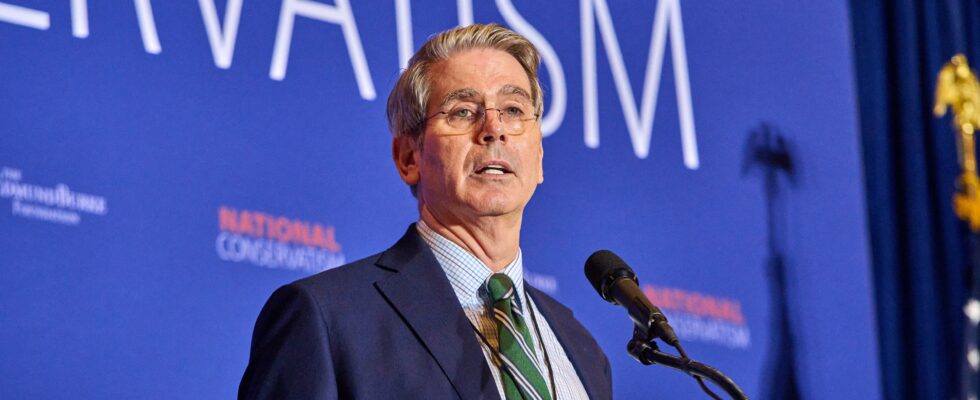The name of Scott Bessent has been added to the trombinoscope of the Trump administration, revealed slowly in recent weeks. This hedge fund executive, who previously worked with billionaire George Soros, will succeed Janet Yellen in the strategic post of Treasury Secretary. His mission? Nothing more and nothing less than helping Donald Trump “launch a new golden age for the United States”, in the words of the president-elect.
More concretely, Scott Bessent summarizes his doctrine with a “3-3-3 plan”: he aims to reduce the public deficit to 3% of GDP, achieve 3% growth and increase oil production by 3%. million barrels per day. He also pleads for a more moderate approach on customs barriers, which will force him to come to terms with a more aggressive vision, particularly towards China, of part of the administration. Ultimately, his appointment demonstrates Donald Trump’s desire to be pragmatic on the economic side, explains Samy Chaar, chief economist at Lombard Odier, to Express.
L’Express: In your opinion, what tipped the scales in favor of Scott Bessent for this coveted position?
Samy Chaar: Donald Trump’s priority was to appoint someone who would be well received by the markets. Scott Bessent is a public figure, known to investors, and who has often expressed his opinions on the financial situation. His appointment therefore seems to be a rather reasonable choice. Especially since to implement his policies, Donald Trump needed someone pragmatic, which can completely be said of Scott Bessent. We saw it in his career, as much in his hedge fund as in his work with George Soros. So perhaps it was his pragmatism that allowed him to win.
That said, the other options were also credible and somehow just as conventional. The candidacy of Kevin Warsh, who was governor of the Federal Reserve between 2006 and 2011, was notably studied. Ultimately, Donald Trump made a choice that a Democrat could have made for the Treasury. For the rest, not at all.
Scott Bessent’s positions seem more measured than those of other members of the administration. What might be the challenges of working with the rest of the team?
We clearly felt that there were two logics in the formation of this administration: on the identity, security or trade aspects, Donald Trump had an uncompromising approach, where he pushed for very “MAGA” personalities. [NDLR : Make America Great Again]. On the other hand, for issues related to business and the economy, he would probably act in continuity with his first mandate and choose someone close to the financial markets. In 2017, he had already appointed Steven Mnuchin, who came from Goldman Sachs.
A major challenge for Scott Bessent will be getting along with Howard Lutnick, in charge of international trade. The latter seems to have a much more dogmatic and harsher approach, while Scott Bessent seems more transactional and pragmatic, particularly on the issue of customs duties and the relationship with China. How will they manage to interact? Will Scott Bessent be forced to toughen up his speech and his policies? Or on the contrary, will Donald Trump be comfortable with a “good cop, bad cop” system, where we could imagine Scott Bessent in the first role and Howard Lutnick in the second. They could also agree to try to optimize trade agreements with China and with certain European countries.
If customs tariffs are mainly used as a means of pressure, in a transactional logic, they would not constitute as important a source of revenue as announced. What would Scott Bessent’s plan be to compensate for this?
Scott Bessent’s idea is rather to promote growth with a stated objective of 3%, to give purchasing power to Americans, by producing a lot of oil (3 million barrels per day more), which would make it possible to bring down energy prices. This would free up purchasing power for Americans by allowing them to have more income, coming not from tariffs but from nominal growth.
Some of Donald Trump’s policies are potentially inflationary, including tariffs, immigration and adding velocity to the economy. But on the other hand, there is an argument to say that overall inflation could be brought under control, through this drop in the price of oil.
The president-elect listed several issues he would like to address on his “first day” at the White House. What could Scott Bessent’s priority topics be?
The issue of customs tariffs will quickly come to the forefront. Scott Bessent will also have to work on developing the budget and trying to pass the tax law. It will aim to extend, or even increase, the tax cuts of the first Trump term, which expire at the end of 2025. In any case, all of this will have to be negotiated quickly.
.
